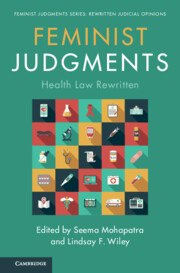Book contents
- Feminist Judgments: Health Law Rewritten
- Feminist Judgments Series Editors
- Feminist Judgments: Health Law Rewritten
- Copyright page
- Contents
- Advisory Panel for Feminist Judgments Series
- Titles in the US Feminist Judgments Series
- Advisory Panel for Feminist Judgments: Health Law Rewritten
- Contributors
- Acknowledgments
- 1 Introduction
- 2 Commentary on Schloendorff v. Society of New York Hospital
- 3 Commentary on Reynolds v. McNichols
- 4 Commentary on Conservatorship of Valerie N.
- 5 Commentary on Bouvia v. Superior Court
- 6 Commentary on Moore v. Regents of the University of California
- 7 Commentary on Linton v. Commissioner of Health and Environment
- 8 Commentary on Olmstead v. L.C. ex rel. Zimring
- 9 Commentary on Doe v. Mutual of Omaha
- 10 Commentary on Smith v. Rasmussen
- 11 Commentary on Burton v. State
- 12 Commentary on National Federation of Independent Business v. Sebelius
- 13 Commentary on Means v. United States Conference of Catholic Bishops
- 14 Commentary on Does v. Gillespie
- 15 Commentary on National Institute of Family and Life Advocates v. Becerra
3 - Commentary on Reynolds v. McNichols
Published online by Cambridge University Press: 15 December 2022
- Feminist Judgments: Health Law Rewritten
- Feminist Judgments Series Editors
- Feminist Judgments: Health Law Rewritten
- Copyright page
- Contents
- Advisory Panel for Feminist Judgments Series
- Titles in the US Feminist Judgments Series
- Advisory Panel for Feminist Judgments: Health Law Rewritten
- Contributors
- Acknowledgments
- 1 Introduction
- 2 Commentary on Schloendorff v. Society of New York Hospital
- 3 Commentary on Reynolds v. McNichols
- 4 Commentary on Conservatorship of Valerie N.
- 5 Commentary on Bouvia v. Superior Court
- 6 Commentary on Moore v. Regents of the University of California
- 7 Commentary on Linton v. Commissioner of Health and Environment
- 8 Commentary on Olmstead v. L.C. ex rel. Zimring
- 9 Commentary on Doe v. Mutual of Omaha
- 10 Commentary on Smith v. Rasmussen
- 11 Commentary on Burton v. State
- 12 Commentary on National Federation of Independent Business v. Sebelius
- 13 Commentary on Means v. United States Conference of Catholic Bishops
- 14 Commentary on Does v. Gillespie
- 15 Commentary on National Institute of Family and Life Advocates v. Becerra
Summary
Reynolds v. McNichols is a 1973 opinion from the Tenth Circuit Court of Appeals. Although the plaintiff was never convicted of prostitution or diagosed with an infection, she was held, examined, and involuntarily treated for sexually transmitted infections under the city of Denver’s “hold and treat” ordinance. The Tenth Circuit rejected her due process and equal protection challenges to the ordinance. In her feminist rewrite, Professor Wendy Parmet questions the health officials’ assumptions that female sex workers are “the primary source of venereal disease” and that the city can only protect the public’s health by forcibly treating them. She holds that the application of the ordinance to the plaintiff was discriminatory and that, under the circumstances, the defendants’ forced treatment of the plaintiff violated her right to privacy and their failure to obtain a warrant before forcing her to submit to a medical examination or remain in detention constituted an unreasonable search. In her commentary, Professor Aziza Ahmed situates the case in terms of historical responses to sex work under the banner of public health.
Keywords
- Type
- Chapter
- Information
- Feminist Judgments: Health Law Rewritten , pp. 41 - 65Publisher: Cambridge University PressPrint publication year: 2022

